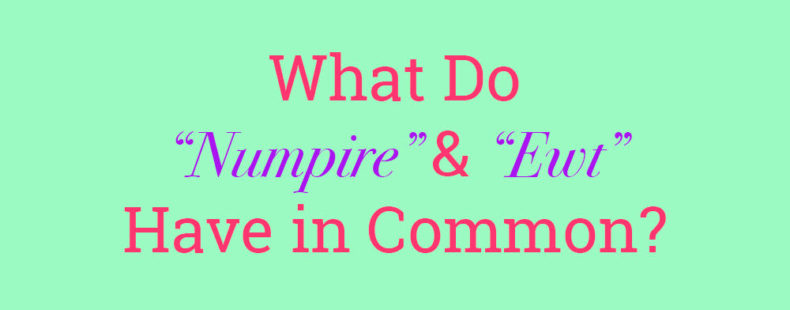These funny-looking words may not be recognizable, but they were the ancestors of our modern-day umpire and newt. So, how did they evolve into their current forms? Because of the pesky letter n, the indefinite article a/an, and the fact that a bunch of English-speakers hundreds of years ago had hearing problems.
The bouncing n and rebracketing
Words like numpire and ewt underwent a process we’re playfully calling the bouncing n. This isn’t a technical term, but it describes how, through a particular linguistic process called rebracketing, some words—like today’s newt and umpire—either started with an n and later lost it or didn’t have an n in the beginning but acquired it over time. And, these things happened pretty much because of the word an: the boring indefinite article that came before the word. The “bouncing” part of the process is obviously figurative. In some cases, the n bounced over from the indefinite article to attach to a word, and sometimes the n bounced from a word to the indefinite article, instead.
How mishearing relates to
the bouncing
n
Back to the English-speakers with hearing problems. And, to be clear, not all people in the Middle Ages were deaf! This isn’t about deafness but about mishearing or misinterpreting sounds. Mishearing happens all the time in spoken language and can affect the shape of words. In writing, it’s easy to see word boundaries because of the spaces that surround words, but, in oral communication, it’s often hard to hear where one word ends and another begins.
For example, you’d need context to help determine the difference between someone saying “an ice pop” and “a nice pop.” You’d have to determine in your mind where to put the (invisible) brackets between words to know the correct reference. Icy treat around? Your brackets would look like this: [An] [ice] [pop]. World’s #1 Dad in the room? [A] [nice] [pop]. In this case, the brackets shift, or rebracket, depending on what’s described and what makes sense.
N bounces away from numpire
So, here’s what happened with umpire. The word was born with an n; it comes from the Old French noumpere, meaning “odd number” or “not equal,” and the term was used for a third person who helped settle disputes. English picked up the French word in its original form, a noumpere. But, speakers over time misheard it so often that the word was rebracketed. The n bounced over to the indefinite article so that [a] [noumpere] became [an] [oumpere], which led to an umpire yelling “3 strikes, and you’re OUT!” on American baseball fields.
N bounces over to ewt
The reverse process happened with newt. Newt didn’t have the n to begin with, but “an ewt” was misheard as “a newt.” Word boundaries shifted, brackets rebracketed, and a certain American politician is now named Newt (instead of the more amusing Ewt).
Other examples of the bouncing n
Like umpire, apron and uncle were originally napron and nuncle until the n bounced away. And, like newt, the n bounced over to nickname. It was originally ekename, from eke, a Middle English word meaning “a little extra.” (We still use eke today: to eke out a win, an income, or a little more toothpaste from the tube.) Through rebracketing, [an] [ekename] was misheard enough times to become [a] [nekename], and now we have nickname.
All in all, because of the bouncing n, we don’t scream at numps for their bad calls, wear naprons while making killer spaghetti sauce, or watch ewts scuttle in the grass. How different is our world because of it? Not very . . . maybe, not at all. But, we may have just come up with an idea for a new board game: Ewts a Nladders, nawesome right?












